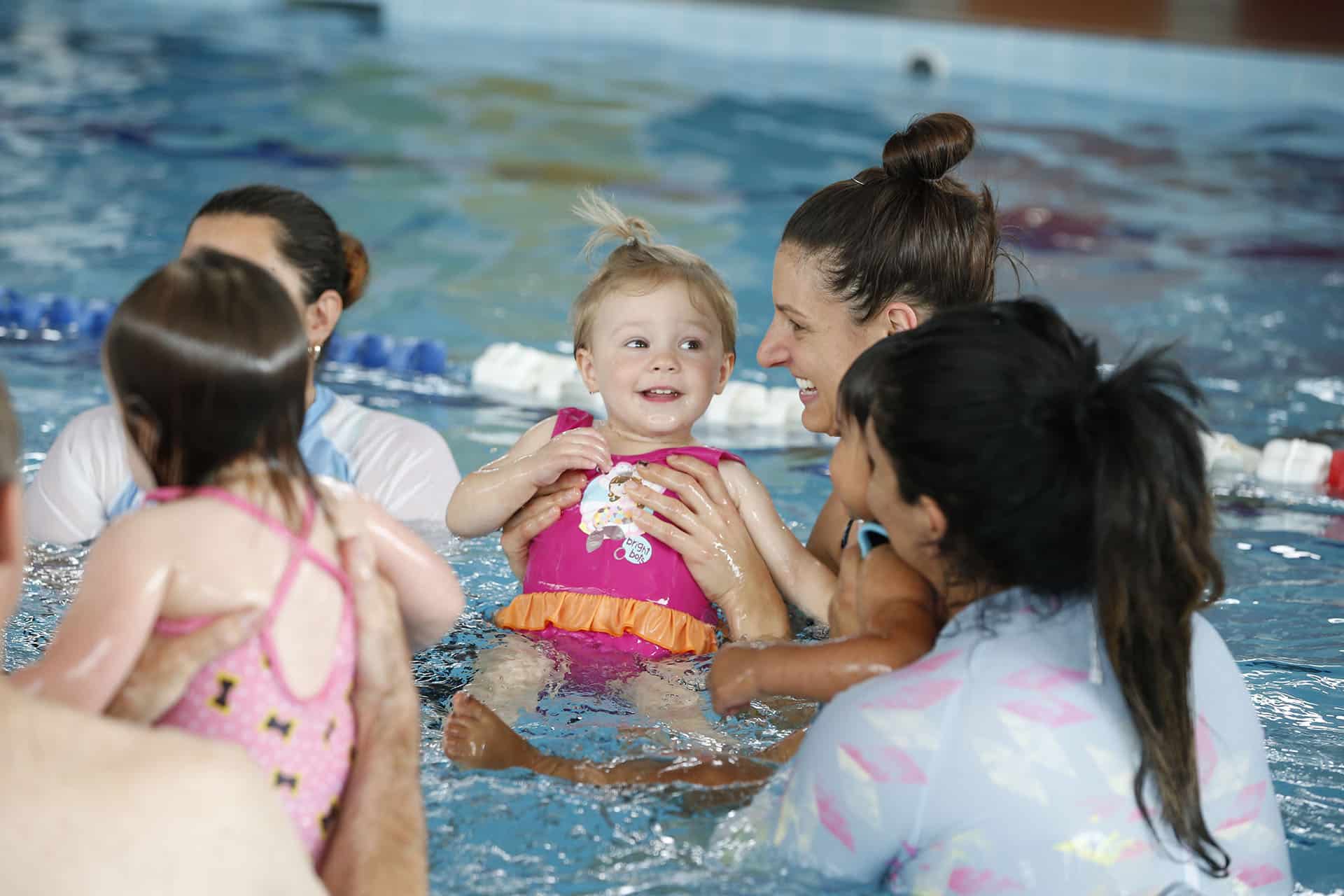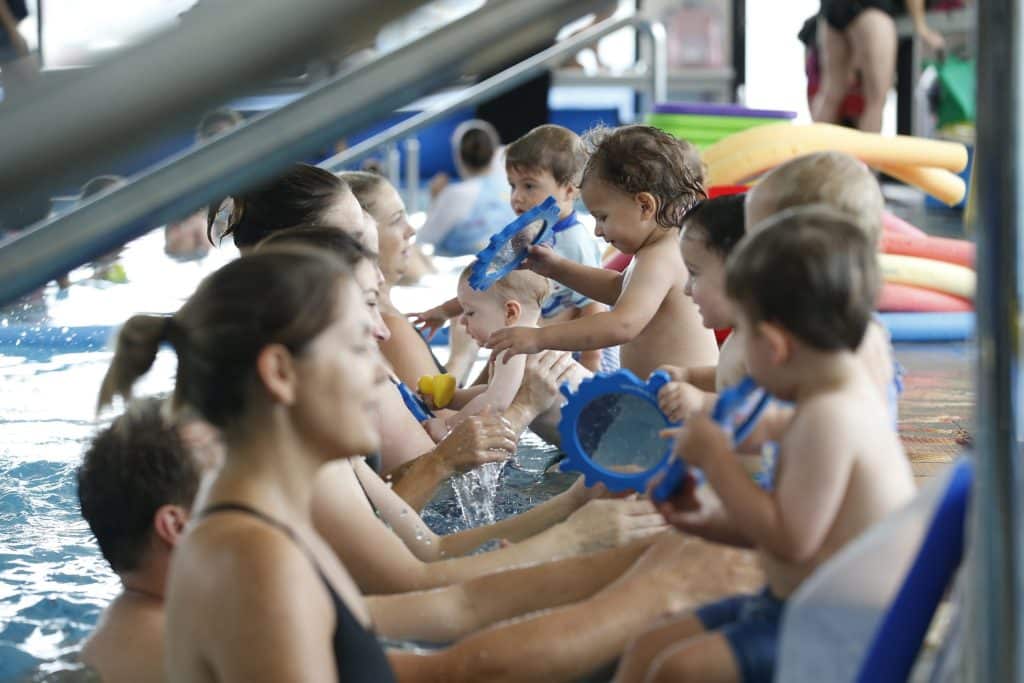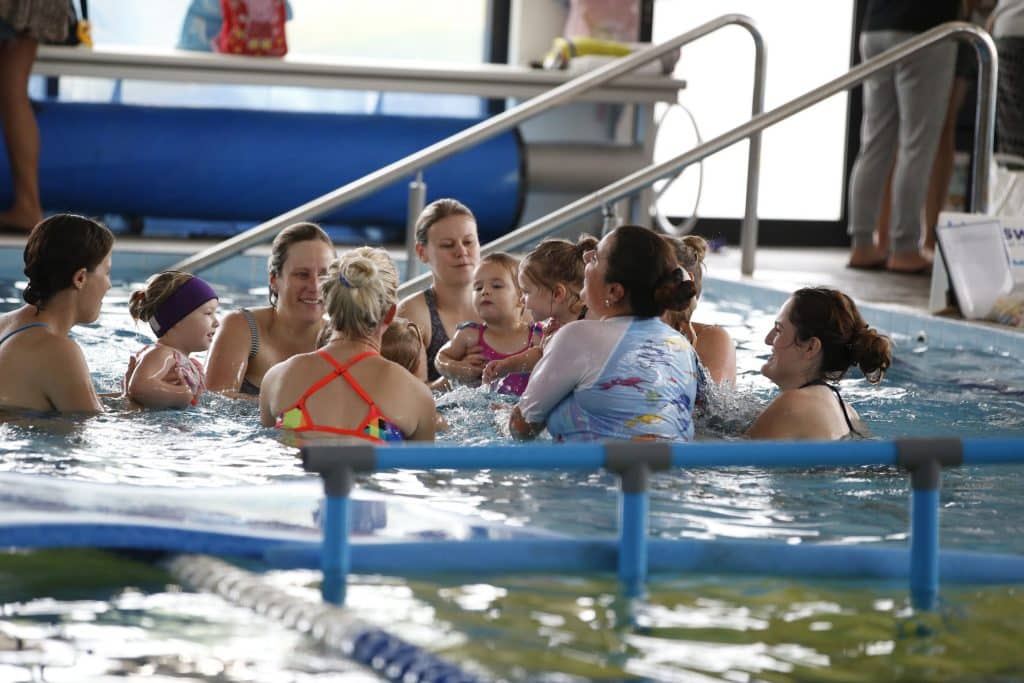
Most Australian adults have forgotten how they learned to swim, it is such a large part of our culture – from fun activities in the neighbour’s pool to hanging out at public pools over the school holidays, most of us have fond memories of hanging out in the swimming pool during our youth.
When we become parents, we quickly realise our children have so much access to water that the risk of drowning is something we need to consider frequently, and at this stage, always dressing your child in a life jacket is considered a little excessive. So most new parents start thinking about what to do to keep their child safe around water (providing adult supervision is a MUST) along with preparing them for the amazing water experiences they will be exposed to throughout life. At this time the same question always comes up – “When can babies start swimming lessons?” That question is asked almost daily to the team at Kirby Swim and it’s exactly what this article aims to answer so read on.
When should babies start swimming lessons?
Studies show that by starting baby swimming lessons as young as 6-weeks of age, babies gain better hand control and more appreciation for the underwater environment which can lower their fear of water. It’s never too early to start water activities with babies.
We recommend enrolling your baby in swimming lessons as soon as you can. Lessons for infants is lots of fun and can help them develop basic skills as well as cognitive skills.
However, even if they’re no longer “babies” and haven’t had any experience with swimming, it is never too late to start – studies show that infants who started after 7 months still gain benefits for cognition and motor skills development through formal swimming lessons.
If you do wait until your child is older (say 8-12 months of age) be sure to sign up for one class per week, as regular interaction with a large body of water will not only increase their swim readiness skills but also life-long water safety habits.

What are the benefits of swimming lessons for babies?
Swimming lessons provide many benefits. Not only are they beneficial for the muscles in your baby’s arms and legs, but they also train coordination between brain and muscle memory through games that are physically tiring enough to be an effective exercise.
Teaching your baby swimming skills enhances their problem-solving ability by teaching them how to go from one pool toy to another. Bringing your baby to swimming lessons also improves water safety knowledge by teaching them primitive swimming strokes that can keep your child safe for years to come.
Classes for kids might just seem like playing fun pool games, but they are also learning about common hazards near a swimming pool such as drains, the need to swim with a partner, and swimming pool safety.
How to know if your baby is ready to take swim lessons
Choosing the right time to start baby swimming classes can be difficult. We feel that it’s never to early to start learning basic swimming skills. Kirby Swim’s babies swimming lessons program is designed for babies aged 6 weeks and beyond – if your baby is very young, or was born prematurely, we recommend you seek medical advice before enrolling.
No matter their age, parents should be prepared for their child to resist or fear swimming initially, but once they are submerged in water, most will enjoy it. Ultimately only you and your child knows whether they want to learn how to swim – if you think your little one would like swim lessons, make sure they gain adequate swimming skills by setting them up with a qualified swimming instructor; you shouldn’t try teaching them yourself.

Types of swimming classes for babies
Most swimming organisation will have their own structure for the swimming classes for babies they offer but most are rather similar at their core. Here at Kirby Swim, we offer 5 different types of swimming instructions for babies – all include the parent being present with the child. Increase your baby’s water familiarisation, improve their life skills and decrease their (and your) anxiety about swimming by enrolling in baby swimming lessons today.
We have group classes as well as private swimming lessons.
The cost of swim lessons includes your child, yourself or carer & the qualified swimming instructor.
If you’re interested in private infant swim lessons – you should contact a swimming school near you or if you’re in the Perth area you can find more information about our private swimming lessons in Perth here.
Baby Dolphin
6 weeks → 6 months: A gentle introduction to swimming with the first concepts of safety, propulsion, floating and breath control learned
Dolphin
6 months → 1 year & walking: Continuing from our introduction to water, we now teach more advanced safety, propulsion, breath control and floating skills in a fun and playful way to maximise learning and retention.
Jelly Fish
1 year & walking → 22 months: This is the highest risk age for drowning in children, so we focus heavily on safety and independence skills, within a fun learning environment. We aim to make safety responses more automatic with our patterning and repetition of important skills.
Starfish
22 months → 3 years: We progress you child’s safety, propulsion, floating and breath control skills and start to aim for periods of independence. We integrate learning into a fun environment to keep little swimmers engaged and progressing.
Turtle Transition
2.5 years → 3 years: For the very confident and increasingly independent young swimmer, this level aims to enhance the transition from parent-led swimming to teacher-led swimming. We increase independence and progress more rapidly in this level. Parents are still in the water, but assisting children to become comfortable with teacher-led learning, for the next phase of their learns to swim journey from age 3 onwards.
Many swim schools around the world are similar in how they structure their lessons, so you can be assured that no matter where you go, your baby’s swim classes are recognised.
Water safety and drowning prevention for babies
Knowledge of swimming and water safety can reduce a child’s drowning risk and provide them with skills that may one day save a life. This has led the Victorian Government to implement the Swimming in Schools Initiative which supports the delivery of quality swimming and water safety education.
Kirby Swim promotes that you cannot “drown proof” any little ones, nothing is more important than supervision. In our baby and Toddler classes we aim to, through the parents, teach little swimmers how to do the little things we take for granted, these are essential safety skills that may one day save their life.
The skills we teach are progressive and targeted to your child’s individual level of development. We teach four main groups of skills:
– Safety Skills
– Floating skills
– Breath control skills
– Propulsion skills.
Everything we teach is focused on helping your child learn to become a stronger, safer and more confident swimmer who is prepared for water activities that are the core of our Australian way of life.
Conclusion
You’ve made it! The end of our blog post. We hope you found some useful information in this article about when babies can start swimming lessons, what the benefits are for taking them, and how to know if they’re ready. If there’s anything else we’ve missed that you want to learn more about please reach out. Thanks again for reading and have a great day!